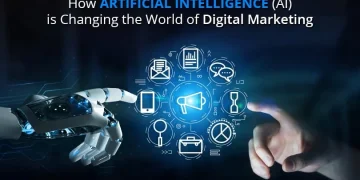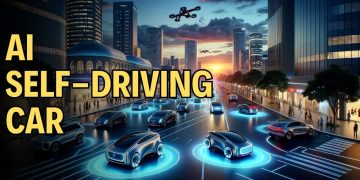The future of artificial intelligence is rapidly unfolding before our eyes, redefining how we work, live, and interact with technology. With AI systems now capable of writing articles, diagnosing diseases, and even composing music, the evolution of artificial intelligence has moved beyond theory into transformative real-world applications.
As we enter 2025 and beyond, AI is expected to accelerate automation, enhance decision-making, and reshape entire industries. But alongside these advancements come critical challenges related to ethics, privacy, and employment. In this article, we explore what lies ahead for AI and what it means for the future of humanity.
🤖 What Is Artificial Intelligence?
Artificial Intelligence (AI) refers to machines or software that mimic human intelligence to perform tasks such as reasoning, learning, problem-solving, and understanding language. It includes:
- Machine Learning (ML): Algorithms that improve from experience
- Natural Language Processing (NLP): AI understanding and generating human language
- Computer Vision: Interpreting visual information
- Robotics: Machines performing physical tasks
AI is not a single technology but a broad field driving innovation across multiple domains.
🔮 Key Trends Shaping the Future of Artificial Intelligence
1. AI-Powered Automation
From self-driving cars to automated factories, AI will replace or augment many manual tasks. In 2025:
- Retail, logistics, and customer service will see massive AI deployment.
- “Hyperautomation” will integrate AI with robotics and IoT for seamless efficiency.
2. AI in Healthcare
AI will revolutionize diagnostics, drug discovery, and personalized treatment.
- Tools like GPT-based assistants help doctors with patient communication.
- AI is now identifying patterns in X-rays and MRIs faster than radiologists.
3. AI in Education
AI tutors and adaptive learning systems will personalize education.
- Platforms will adjust teaching based on student performance in real time.
- Chatbots will support learners outside class hours with 24/7 assistance.
4. AI Ethics and Regulation
With growing capabilities comes the need for responsible development:
- Governments are drafting AI legislation to ensure fairness and transparency.
- AI biases, deepfakes, and surveillance are raising urgent ethical questions.
🧠 How AI Will Impact the Job Market
AI is expected to create millions of new jobs but also automate many current ones.
Job Categories Likely to Be Automated:
- Data entry and processing
- Routine customer service
- Basic financial analysis
New Job Opportunities:
- AI ethicists and auditors
- Prompt engineers
- Machine learning specialists
- AI trainers for language models
Upskilling and reskilling will be critical as the workforce adapts to AI-driven roles.
🌍 AI and Global Societal Change
AI for Sustainability
AI will play a key role in addressing climate change:
- Smart grids to optimize energy use
- AI-powered crop monitoring to improve food security
AI in Governance
Governments are exploring AI for:
- Policy analysis
- Smart city management
- Crime prediction and resource allocation
However, these uses raise concerns about bias, surveillance, and privacy.
🔐 Risks and Challenges of the Future of Artificial Intelligence
- Bias in Algorithms
AI trained on biased data can lead to unfair outcomes in hiring, lending, and policing. - Data Privacy
With AI analyzing massive datasets, protecting user privacy becomes more complex. - Autonomous Weapons
There’s a growing debate over the development of AI-controlled military systems. - Dependence on Technology
Over-reliance on AI may reduce human oversight and critical thinking.
Governments and tech companies must collaborate to create ethical AI frameworks.
💡 What Can You Do to Prepare?
- Stay Informed: Follow trusted AI research sources (e.g., OpenAI, DeepMind, MIT AI Lab).
- Learn AI Basics: Platforms like Coursera, edX, and Khan Academy offer free AI courses.
- Develop Digital Skills: Coding, data analysis, and critical thinking will remain valuable.
- Engage Ethically: Support policies and products that promote fair, inclusive, and transparent AI.
❓FAQs: Future of Artificial Intelligence
Q1: Will AI replace humans?
AI will automate some tasks but create many new jobs. Humans will remain essential in roles needing creativity, empathy, and ethics.
Q2: Can AI become sentient?
Currently, no AI is sentient or conscious. The debate continues about whether true AGI (Artificial General Intelligence) is achievable.
Q3: How will AI affect small businesses?
AI tools will empower small businesses with automation, marketing insights, and customer support at a lower cost.
Q4: Is AI dangerous?
Like any technology, AI can be misused. Ethical design, regulation, and transparency are key to minimizing risks.
Conclusion
The future of artificial intelligence promises enormous opportunities and unprecedented challenges. As AI becomes more integrated into our lives, it’s up to developers, governments, and everyday users to shape its evolution responsibly. Whether you’re an innovator or a curious learner, staying informed and proactive will ensure you’re ready for the AI-powered world ahead.









